GENERAL DATA
Plant Parts: Fruits, Gall
Cultivation Mode: Wild collection
In Manufacturing: Pharmaceutical, Leather manufacturing, Ink manufacturing, Dyeing manufacturing.
🌰 Industries That Use Aleppo Oak Galls (Quercus infectoria G. Olivier)
Aleppo Oak Galls—also known as Oak Gallnuts—are hard, spherical growths formed on the young twigs of Quercus infectoria due to the activity of gall wasps (Cynips spp.). These gallnuts are extremely rich in tannins (up to 50–70%) and have a long-standing role in medicine, ink production, leather tanning, and cosmetics.
1. Pharmaceutical & Traditional Medicine Industry
Used for thousands of years in Persian, Unani, Ayurvedic, and traditional Chinese medicine for their astringent, antibacterial, and healing properties.
Applications:
-
Treatment of diarrhea, dysentery, and internal bleeding
-
Used as mouthwash for sore gums and oral ulcers
-
Applied topically to treat wounds, vaginal tightening, and skin irritation
-
Included in postpartum care for women
-
Strong hemostatic and astringent actions
✅ Common forms: powdered gallnut, decoction, ointments, vaginal suppositories
2. Dye, Ink & Artisanal Industry
Historically, gallnuts were the primary source of black ink in manuscripts from the Middle Ages through the 19th century.
Uses:
-
Traditional iron-gall ink (from tannic and gallic acids)
-
Natural dyeing of textiles, parchments, and paper
-
Mordant in natural dye processes
✅ Still used in historical document restoration and artisanal ink making
3. Cosmetic & Personal Care Industry
The astringent and skin-tightening properties make gallnuts valuable in skincare formulations.
Uses:
-
Included in face masks, pore-tightening serums, and acne treatments
-
Used in vaginal care gels, tightening creams, and bath blends
-
Traditional beauty use for firming and toning skin
✅ Especially valued in Asian and Middle Eastern beauty regimens
4. Leather Tanning & Textile Industry
Oak gallnuts are one of the strongest natural tannin sources, ideal for vegetable tanning processes.
Applications:
-
Used in premium leather tanning for high-quality goods
-
Enhances flexibility and durability of leather
-
Serves as a natural mordant for wool and silk
✅ Eco-friendly and chemical-free tanning alternative
5. Veterinary & Ethnoveterinary Medicine
Used in rural and traditional animal care systems.
Applications:
-
Treatment of diarrhea and intestinal parasites in livestock
-
Applied externally to heal wounds and insect bites
✅ Often combined with herbal decoctions in local animal husbandry
6. Nutraceutical & Supplement Industry
Gaining interest for its antioxidant, anti-inflammatory, and prebiotic properties.
Potential Uses:
-
Oral health rinses
-
Antioxidant capsules or powders
-
Gut health formulations
✅ Subject of ongoing research for gut microbiota and immunity
✅ Summary of Key Applications
| Industry | Common Uses |
|---|---|
| Pharmaceutical & Traditional | Astringent medicine, anti-diarrheal, wound healing, oral care |
| Dye & Ink | Iron-gall ink, parchment ink, fabric mordants |
| Cosmetic | Acne masks, pore tightening, firming creams, vaginal care |
| Leather/Textile | Vegetable tanning, wool/silk mordant |
| Veterinary | Livestock diarrhea treatment, wound care |
| Nutraceutical | Prebiotic supplement, anti-inflammatory, oral health products |
🌰 Key Features:
-
Extremely high tannin content (50–70%)
-
Natural source of gallic acid
-
Eco-friendly and biodegradable
-
Used since ancient times across Europe, Asia, and the Middle East
-
Harvested primarily from young galls on twigs
🌿 Industries That Use White Aleppo Galls (Quercus petraea)
White Aleppo Galls—also known as White Gallnuts—are pale, dense structures formed on Quercus petraea (Sessile Oak) due to insect activity (usually by gall wasps). While lower in tannin concentration than Q. infectoria galls, they are still valued across several industries due to their milder astringency and unique phytochemical profile.
1. Cosmetic & Personal Care Industry
White gall extract is appreciated for its gentler astringent action, ideal for sensitive or reactive skin types.
Applications:
-
Skin toners & firming gels
-
Anti-acne masks (for oily yet sensitive skin)
-
Aftershave lotions and pore-tightening treatments
-
Herbal mouthwashes or gargles
✅ Often used in formulations where harsh tannins would irritate the skin.
2. Pharmaceutical & Traditional Medicine
Used in some mild herbal remedies for its astringent, antimicrobial, and anti-inflammatory effects.
Common uses:
-
Herbal pastes and gargles for mouth ulcers
-
Sitz baths for hemorrhoids or skin irritation
-
External treatments for minor wounds or weeping eczema
✅ Preferred when a gentler action is desired compared to dark galls.
3. Natural Dyeing & Textile Industry
Though not as intense as dark galls, white Aleppo galls still provide tannins useful in fabric pre-treatment and light dye fixing.
Roles:
-
Mordanting protein fibers (wool, silk)
-
Gentle beige/tan tone application
-
Stabilizing natural dyes in soft color palettes
✅ Useful in eco-dyeing projects or children’s clothing, where low-toxicity is preferred.
4. Leather Tanning Industry
Used in vegetable tanning for soft, light-colored leathers such as:
-
Gloves
-
Bookbinding leather
-
Luxury accessories
✅ Gives a smoother finish and less color distortion compared to harsh tanning agents.
5. Oral & Dental Hygiene Products
The milder astringency makes it suitable for:
-
Herbal toothpaste powders
-
Ayurvedic and Unani mouthwashes
-
Gum-firming rinses and powders
✅ A traditional ingredient in natural oral care systems in parts of Iran and Eastern Europe.
6. Ethnic & Export Market
White Aleppo Galls are:
-
Traded as a less expensive alternative to black gallnuts
-
Exported for traditional formulations in South Asia and the Middle East
-
Commonly used in folk crafts and herb-based mixtures
✅ Available in whole, powdered, or broken form for different uses.
✅ Summary of Key Applications
| Industry | Common Uses |
|---|---|
| Cosmetic & Personal Care | Toners, acne masks, anti-aging creams, mouthwashes |
| Pharmaceutical & Herbal | Mild astringents, skin ointments, gargles, compresses |
| Textile & Dyeing | Mordanting light fabrics, beige/soft dye shades |
| Leather Tanning | Light vegetable tanning, fine leather preparation |
| Oral Hygiene | Gum tonics, herbal mouthwashes, dentifrices |
| Export & Folk Medicine | Herbal blends, crafts, household remedies |
🌳 Key Features:
-
Derived from Quercus petraea (Sessile Oak)
-
Lower tannin but milder on skin and mucosa
-
Ideal for sensitive applications (skin, oral, textile)
-
Economical and eco-friendly tannin source
-
Available in whole, sliced, or powdered form
🌰 Comparison: Aleppo Oak Galls from Quercus infectoria vs Quercus petraea
| Feature | Quercus infectoria (Dark Gall) | Quercus petraea (White Gall) |
|---|---|---|
| Common Name | Aleppo Gallnut / Black Gall / Turkish Gall | White Gallnut / White Aleppo Gall |
| Color | Dark brown to black | Pale beige to off-white |
| Shape & Size | Round, 1–2 cm, dense and hard | Slightly irregular, lighter, sometimes hollow |
| Tannin Content | Very high (50–70%) | Moderate to high (30–50%) |
| Gallic Acid Yield | High | Lower than Q. infectoria |
| Main Constituents | Tannic acid, gallic acid, ellagic acid, flavonoids | Tannins, ellagitannins, trace gallic acid |
| Botanical Source | Young twigs infested by Cynips tinctoria wasps | Often from older branches, sometimes with less wasp activity |
| Geographic Distribution | Iran, Iraq, Turkey, Syria, India | Central Europe, Iran (Zagros), Caucasus |
| Ink & Dye Production | Traditional ink, mordant, natural dyeing | Less preferred—gives lighter colors |
| Medical Use | Highly favored in traditional medicine | Used less frequently; milder astringent effect |
| Cosmetic Use | Firming, tightening, anti-acne | Gentle toner or additive for sensitive skin |
| Price / Market Value | Higher (premium traditional material) | Lower (due to lower active content) |
✅ Summary
-
Quercus infectoria gallnuts (dark/brown) are richer in tannins and gallic acid, and more potent in medicinal, dyeing, and ink applications.
-
Quercus petraea gallnuts (white) are less potent, but still used in lighter skincare, tanning, or where gentler astringency is preferred.
-
While they share some uses, they are not interchangeable in pharmaceutical-grade or high-quality ink production.
HARVEST CALENDAR
Feb
Mar
Apr
May
Jun
Jul
Aug
Sep
Oct
Nov
Dec
To order Oak Galls, please contact us.
About Quercus Infectoria
The height of the Quercus infectoria tree reaches six meters. The leaves of this plant are oval and relatively large, and their sides have curved, small and slightly wrinkled teeth. Its yellow flowers grow in long and hanging clusters.
The fruit is elongated and oval, and at the bottom, there is a cup-shaped appendage that connects the fruit to the stem. Fruit’s peel is green at first. But after fully ripening, it becomes wooden and turns brown. They are very similar to Oak fruit, but a little bigger and has a bowl-shaped appendage. Inside each fruit there is a kernel, and a thin brown membrane between the kernel and the wooden shell.
On the branches of this tree, relatively large, spherical and hard appendages are formed, on their surface, small bumps are seen, which are actually a kind of scab.
The best type of Oak Galls are slightly green, heavy, gassy and without holes.
Oak Galls Chemical Constituent
Gallotannic acid 50-70%.
Oak Galls Temperament
First degree of cold and second degree of dry.
4. Pulverize it softly, then knead it with a little eighty degrees alcohol and put it in the middle of the cervix at night and clean it with water in the morning. Eliminates abnormal vaginal secretion.
5. Pulverize Oak Galls softly and sprinkle it on the children’s anus that comes out. It cures it.
6. Pulverize Oak Galls softly, mix it with henna and knead it and tie it to your feet. Removes sweat and foot infection.
Oak Galls Side Effects
Aleppo Oak Gallnuts should not be taken more than a few pieces a week, because it will have a negative effect on the throat and chest.
To order Apple Oak Galls, please contact us.

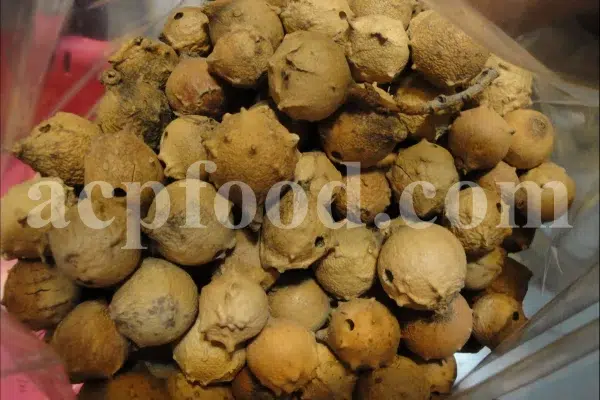
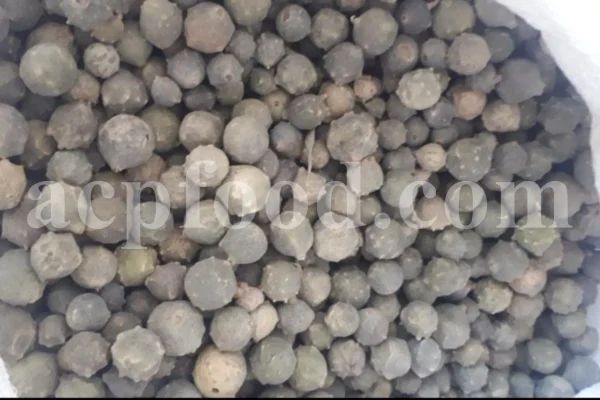
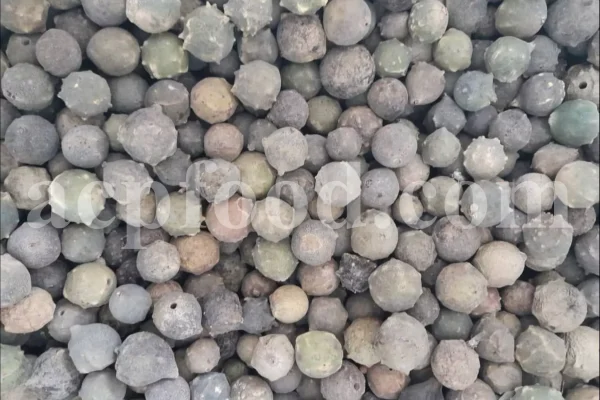
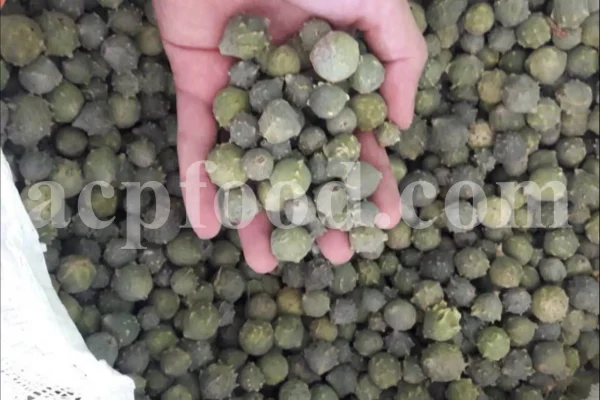
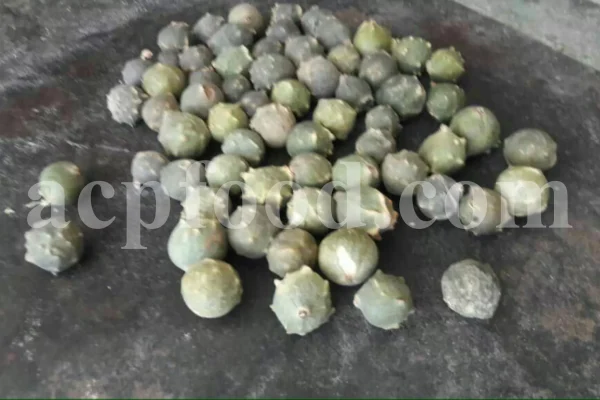
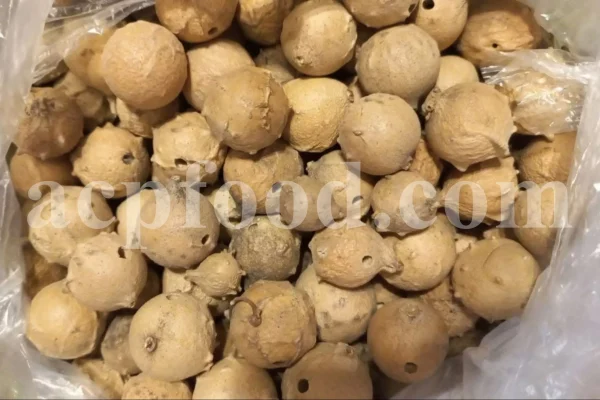
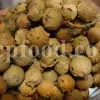

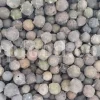



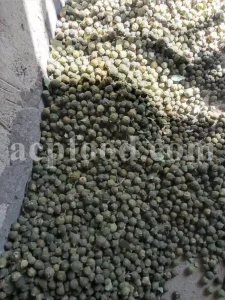
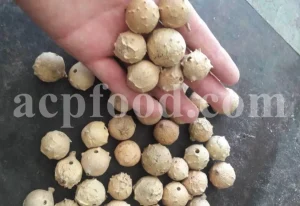

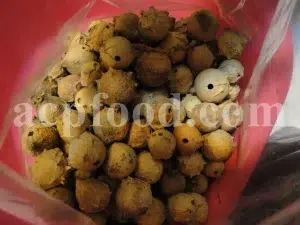

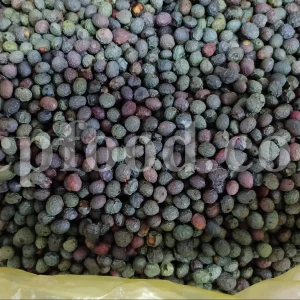
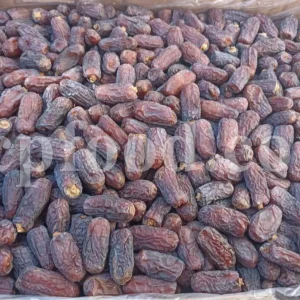
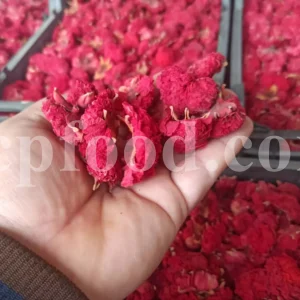
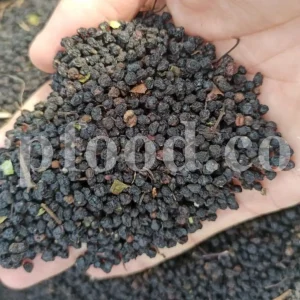
Reviews
There are no reviews yet.